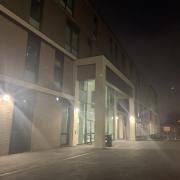
Many students, parents and teachers in the UK are worried about the future of our learning, due to the ongoing pandemic situation. This is a cause for concern, as many students, particularly those in Year 12, have summer exams approaching next term which give some of us the predicted grades we need to apply for university next year. So, although online learning is currently serving as an alternative to school, how will this work if we are still unable to return to school by the time exam season draws closer? More importantly, is online learning even an effective substitute for school?
Online learning is a practical temporary replacement to school, as it offers us some sort of schedule to follow during the week and it is a way of getting through the syllabus, as we would in lessons. However, many students have recently been complaining about the lack of communication we now have with teachers, compared to how it would be in school. Although we can email our teachers, it is not the same as a face-to-face interaction because we cannot express our difficulties within certain subject content as efficiently as we would be able to if we could speak to them directly. School policies are justified in restricting us from video calling our teachers, as this dilutes the professional relationship we have with our teachers. Despite this, not having direct communication with our teachers impacts our understanding of the subject, and therefore causes many of us to worry over our exams next year. This consequently makes us stressed, which may impact our grades in the future. Moreover, there are many students who need to start writing their personal statements and university applications, which is challenging without the proper guidance needed from teachers.
Remote learning mostly consists of us understanding the course ourselves, which is extremely difficult without a teacher to properly guide us. In addition, we are being expected to do the same amount of work as if the teacher was there, and the fact that now we do not have direct communication with a teacher makes this harder. Even though there is not much of an alternative and this is currently the only way to follow our curriculum, we are being set mounds of work besides homework, and this may have a direct impact on our wellbeing, as we are now required to work in the same place all day, with limited interaction with the outside world. Although it can be argued that those taking exams this year may be affected more by the current epidemic, many students in other years are losing vast amounts of critical learning, which is especially key for those with upcoming GCSEs or A Levels. Students taking exams this year have also been offered a solution yet those with exams next year have not been taken into consideration, but hopefully the government can address this problem soon and come up with some form of resolution.
In contrast, there is a huge benefit to online learning – it reduces our overall carbon footprint. We do not need to take public transport, so our carbon dioxide emissions have significantly reduced, and we have even save time and money on commute. The Open University in the UK have found that online courses equate to an average of 90% less energy and 85% fewer CO2 emissions per student than traditional in person courses, showing that remote learning is a great way of helping the environment, and is a step forward in mitigating climate change.
Furthermore, we need to consider the fact that this is the first time we have ever needed to use remote learning, so it will take time for both teachers and students to adapt and completely overcome the transition to e-learning, and hopefully we will improve our methods and build on remote learning in the future.
By Sahana Motta


























